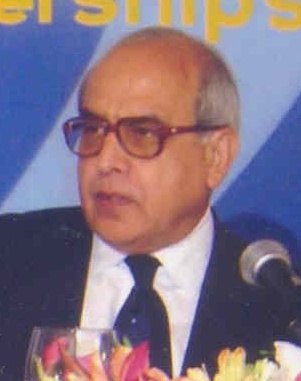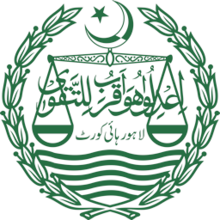Related Research Articles

Farooq Ahmad Khan Leghari, was a Pakistani politician who served as the eighth president of Pakistan from 14 November 1993 until resigning on 2 December 1997. He was the first Baloch to be elected as President.

Syed Sajjad Ali Shah was a Pakistani judge who served as the 13th Chief Justice of Pakistan from 4 June 1994 to 2 December 1997. He had been appointed as Chief Justice of the Supreme Court by Benazir Bhutto. Prior to that, he served as the 6th Chief Justice of Sindh High Court from 13 December 1989 to 4 November 1990.

The Supreme Court of Pakistan is the apex court in the judicial hierarchy of the Islamic Republic of Pakistan.

Nazim Hussain Siddiqui a Pakistani jurist who served as Chief Justice of the Supreme Court of Pakistan, from 31 December 2003 to 29 June 2005.

Sheikh Anwarul Haq, was a Pakistani jurist and an academic who served as the 9th Chief Justice of Pakistan from 23 September 1977 until resigning on 25 March 1981. He signed the death warrant for former Prime Minister Zulfikar Ali Bhutto in a controversial murder case. Bhutto was executed on April 4, 1979.

The Lahore High Court is a provincial court house based in Lahore, Punjab, Pakistan. It was established as a high court on 21 March 1882. The Lahore High Court has jurisdiction over the province of Punjab. The High Court's principal seat is in Lahore, but there are benches in three other cities of the province: Rawalpindi, Multan and Bahawalpur.

Nasir Aslam Zahid ; Barrister-at-Law, is a Pakistani judge who served as the Chief Justice of the Sindh High Court and then a judge of the Federal Shariat Court of Pakistan and Supreme Court of Pakistan.

The High Court of Sindh is the highest judicial institution of the Pakistani province of Sindh. Established in 1906, the Court situated in the provincial capital at Karachi. Apart from being the highest Court of Appeal for Sindh in civil and criminal matters, the Court was the District Court and the Court of Session in Karachi.

Wajihuddin Ahmed is a retired senior justice of the Supreme Court of Pakistan, human rights activist, and former professor of law at the Sindh Muslim Law College.

The Sindh Muslim Government Law College or S. M. Law College is one of the oldest law schools of Pakistan, situated in Karachi, Sindh. The college has produced numerous notables including Chief Justices of Pakistan, Chief Justices of Federal Shariat Court, Chief Ministers of Sindh, Federal Ministers, and many judges of the Supreme Court of Pakistan and Sindh High Court.
Justice Tufail Ali Abdul Rahman was born in Karachi, Sindh in 1921 and belonged to a highly respectable family that produced a lot of legal professionals, government officers and people actively involved in the education sector.

Agha Rafiq Ahmed Khan a Pakistani jurist belongs to Garhi Yasin in Shikarpur District of Sindh, Pakistan. He is the son-in-law of Justice Mushtak Ali Kazi, who was a Judge of High Court of Sindh and Balochistan. Justice Agha is a Senior Advocate of the Supreme Court of Pakistan. He served as the 12th Chief Justice of the Federal Shariat Court of Pakistan from 2009 to 2014.
Hamid Ali Mirza was a Pakistani lawyer. He served as Judge of the Supreme Court of Pakistan and Chief Election Commissioner of Pakistan.

Mir Hazar Khan Khoso was a Pakistani jurist who was the caretaker prime minister of Pakistan from 25 March to 5 June 2013. Khoso was a judge who previously served as the chief justice of the Federal Shariat Court and served as the caretaker prime minister ahead of the general elections scheduled in May 2013.

Anwar Zaheer Jamali is a Pakistani jurist who served as the 24th Chief Justice of Pakistan. He remained in the Supreme Court from 3 August 2009 to 30 December 2016. He has also served as the Acting Chief Election Commissioner of Pakistan, and Chief Justice of the Sindh High Court. In 1995, he was elected as Chairman Executive Committee (CEC) of the Sindh Bar Council and held this position till his elevation to the Bench. He was highly praised for being one of the few judges who refused to take fresh oath under the Provisional Constitutional Order No.1 of 2007. He took several suo motos as a Chief Justice, notably on several human rights cases.
Faisal Arab is a Pakistani jurist who served as justice of the Supreme Court of Pakistan, from 13 December 2015 to 4 November 2020.

Gulzar Ahmed is a Pakistani jurist who served as the 27th Chief Justice of Pakistan from 21 December 2019 to 1 February 2022.
Umar Ata Bandial is a Pakistani jurist who served as the 28th Chief Justice of Pakistan from February 2022 to September 2023. He was appointed as the Chief Justice after the approval by President Arif Alvi on 13 January 2022, after which he assumed his office on 2 February 2022 and retired on 16 September 2023.

Syed Ali Aslam Jafri was a Pakistani jurist, professor of law, social worker, Justice of the Sindh High Court, Federal Ombudsman for Insurance, Director General of Sindh Judicial academy and principal of Sindh Muslim Law College.
Maqbool Baqar is a Pakistani jurist who has served as the Chief Justice of the Sindh High Court and as a justice of the Supreme Court of Pakistan. He is the former the Caretaker Chief Minister of Sindh who served in this position from 17 August 2023 till 27 February 2024.
References
- ↑ "Mr. Justice Sajjad Ali Shah". supremecourt.gov.pk.
- ↑ "Kidnapped Pakistani judge's son found bound in chains". Reuters. 19 July 2016.
- 1 2 3 4 5 6 7 "Honourable Justice". sindhhighcourt.gov.pk.